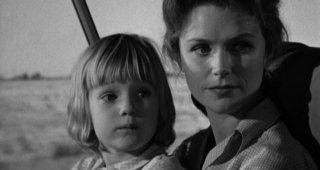
The late Steve McQueen's singular (albeit, not single) contribution to the screen was that he brought his Method Acting background to the action genre, as evidenced by his moody yet muscular work in "The Great Escape" (1963), "Bullitt" (1968), "Le Mans" (1971) and particularly Sam Peckinpah's "The Getaway" (1972). But he also lent his estimable talents to smaller, arguably lesser-known movies -- "Junior Bonner" (his other 1972 film with Peckinpah), "The Reivers" (1969), "The Sand Pebbles" (1966), "The Cincinatti Kid" (1965) and "Love With the Proper Stranger" (1963).
Fitting snugly into this latter group is Robert Mulligan's neglected "Baby, the Rain Must Fall" (1965) which, as we tend to forget (and some of us may not know at all), started life in 1954 as a Horton Foote play, "The Traveling Lady," starring the great Kim Stanley. Foote adapted his play for the occasion and Lee Remick more than met the challenge of standing in for Stanley on screen, turning in a delicate, yet tough-willed performance as Georgette Thomas, a young transient mother who seeks out a new life in Harrison, Texas, which is close to where her incorrigible husband Henry (McQueen) is imprisoned.
But Henry is already out of the pententiary on parole and and performing in a local saloon with a band. Trying to escape from the disapproving grip of Miss Kate, the indominable woman who raised him, and also avoid Georgette and their young daughter Margaret Rose (Kimberly Block), he drinks too much and self-destructs a little more.
The acting here is of first order, dominated by Remick who really has the lead role, and by McQueen who slips into the role of Henry as if it might have been written for him specifically. Remick is especially wonderful in her scenes with the charming Block (a plainspoken, unprecocious child actress) as they make tentative plans to settle in Harrison and talk of planting a Chinaberry tree in the front yard of their future dream house.
There is nothing wrong with "Baby, The Rain Must Fall," which was casually dismissed in its day -- nothing except its title. The film was rather hastily released in January of 1965, with most of advertising hinged to a song that was written for it. Somewhere along the way, Columbia Pictures had become disenchanted with the moniker, "The Traveling Lady," and went with the title of that song for the movie.
The song is good but has a double-edged effect on the film: It brought it a modest amount of popularity in its day but it also seriously mars the film. And as a title, it flatly misrepresents the movie and even undermines its opening credits -- superimposed over a long, extended shot of a highway speeding by, accompanied by some vintage Elmer Bernstein music. These titles were clearly designed when it was called "The Traveling Lady."
"Baby, The Rain Must Fall" was the fourth of seven titles made by the prolific team of director Robert Mulligan and producer Alan J.Pakula, who collaborated on films for about 10 years. Some of their other titles include "To Kill a Mockingbird" (1962), "Love with The Proper Stranger" (1963), "Inside Daisy Clover" (1965) and "Up the Down Staircase" (1976). How their output has managed to evade a major retrospective is beyond me.
A bit of trivia: Pakula hired his wife's first husband for a role in "Baby, The Rain Must Fall." His wife at the time was Hope Lange, and her first husband was Don Murray.
"Baby, The Rain Must Fall" is available from Columbia Home Video for $24.95; an "original music" album (not to be confused with a soundtrack) - featuring portions of the wonderful Bernstein score and, of course, that hummable title song - was made available on Mainstream Records. It is long out of print, but there's always eBay.

For the record, "The Traveling Lady" opened at New York's Playhouse Theatre on October 27th, 1954 and closed after only 30 performances. The play also starred Jack Lord in the role played by McQueen in the film and was directed by Vincent J. Donohue.
There was also a TV production of "The Traveling Lady," which featured Stanley recreating her Broadway role. Hopefully, it's been preserved somewhere.
(
Artwork: Still shot of Lee Remick and Kimberly Block in Columbia's "Baby, The Rain Must Fall"; artwork for the original Broadway production starring Kim Stanley)





















